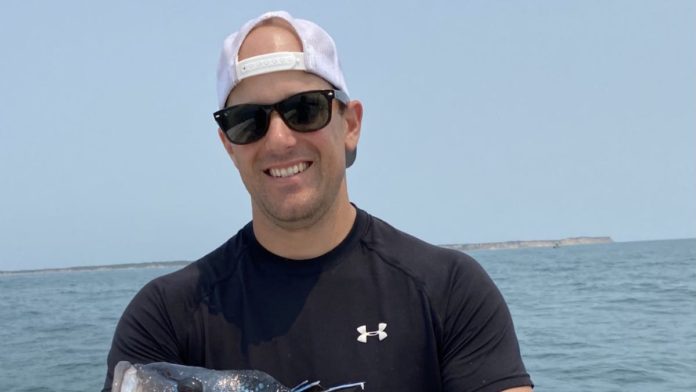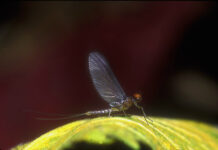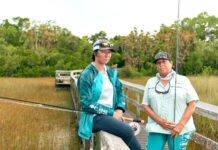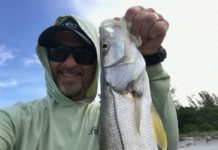Charter boats are reeling in highly valuable fish around Vineyard Sound
U.S. Fish & Wildlife scientist Ken Sprankle shared that since the beginning of July, the southern half of the Connecticut River Basin has been hammered by rain. The result has been record-level dischargers in many rivers. These persistent and extreme flows will likely impact juvenile production of many species including our beloved shad and blueback herring. The cost of climate change for sportsmen is rising.
With the commercial season now open for sea bass, many boats are limiting out around Vineyard Sound and bringing home some big paychecks. Tuna fishing continues to attract many of our anglers who have the big boats necessary to get far enough out. There’s a little confusion about recreational and commercial catches.
For those who rely on charter boats, Capt. Bruce Peters, a master of the tuna grounds east of Chatham, explains some of the subtleties of capturing these highly valuable fish now.
“We have had a nice early run of bluefin tuna so far this season,” he said. “The mackerel are thick in our area to the east of Chatham, and they are attracting the larger bluefin. Our Capeshores Charters has had success on all of our tuna charters so far this season.
“We have had a nice mixture of recreational sized bluefin along with the bigger ones,” he added. “These recreation-sized tuna have been from 65 to 73 inches long, and when dressed into the loins, will return over 100 pounds of fresh tuna meat to take home and cut into steaks. Tuna fishermen need be prepared and bring a cooler large enough to care for such a trophy and delicacy.”
Recreational fishermen who pay for a charter, though, can’t keep any giants they catch. That seems unfair and can cause a misunderstanding.
“Any bluefin tuna fish over 73 inches must be either released, or retained by the boat and sold on the commercial market, as per NMFS HMS rules,” Peters said. Some ethical captains like Peters, however, try to help their paying clients benefit from the catch.
If you are lucky enough to catch a saleable fish while on a charter with Peters, he’ll credit you one-third of the sale proceeds, after expenses, toward your next charter with him. If you’re going to charter a tuna boat, make sure you have such an understanding with your captain.
Fish limits increase at beginning of next month
Many anglers are looking forward to Aug. 1, when the daily limit on tautog or blackfish goes up to three fish. Not many fish taste better than this lobster and crab eater. We should soon see tackle shops begin carrying green crabs, the best bait by far for them. Until we can get green crabs, Capt. Jason Colby suggests alternatively baiting up with spider crabs.
Oakham fly fisherman Peter Rawinski reported good fishing on the catch-and-release section of the Swift River below the dam in Belchertown.
“I’m sure we could have caught significantly more fish if we fished nymphs or egg patterns, but we were committed to dry fly fishing,” he said. “It was warm out, but there was a nice layer of fog along the river for most of the afternoon. There were no real hatches until almost dark when a good number of sulphurs came off the water.
I was able to land one nice rainbow and a brookie on a Blue Winged Olive and then later two other brookies on a Sulphur Dun. My buddy Alex landed two rainbows, one on a caddis emerger and the other on a Sulphur Dun during the hatch. The biggest rainbow pushed 18 inches and ftook his emerger right when it sank below the surface film. The take was incredibly subtle and didn’t even ripple the water.”
Rawinski also reported on fly fishing for sea-run brook trout in Red Brook, which flows into Buttermilk Bay.
“This tiny stream is full of beautiful wild brook trout,” he said. “The key to landing 10 trout was twitching very small streamers tied on nymph hooks, under log jams and undercut banks. A white wooly bugger seemed to be the most effective fly. However, I’m not sure color mattered as much as size and profile. Both Red Brook and its wild sea run trout are very fragile, and it necessarily has to be managed as a catch-and-release water allowing only artificial lures.”
Plant milkweed, monarchs will come
Walk in any milkweed field now, and you can finally see breeding monarch butterflies. It took several generations of them advancing north this year from Mexico to finally reach us. If you have any extra sunny open space to plant milkweed on your land, please consider doing so.
Can’t knock underdog predators
We obviously should never harbor negative feelings toward predators making a life-sustaining kill. Too often, they’re really the underdogs or “undercats” in the struggle for survival.
They naturally play their vital roles without malice in the amoral world of nature. Predators necessarily have no sympathy for their prey as such a feeling would only interfere with their own survival and that of their young. We humans have acquired both sympathy and empathy, positively resulting in all sorts of wildlife conservation regulations and personal lifestyle decisions.
We can afford that empathy now in some places much more than others. It would be foolish, for example, to venture into the Arctic and expect Inuits, who naturally live on whale, seal, walrus, waterfowl, fish and caribou flesh, to be vegetarians. But should we be surprised that in England now, there’s a movement to criminalize the boiling of lobsters, other crustaceans, and mollusks? I thought of these well-intended advocates last night as I put two lobsters in a pot to boil for 12 minutes.
Lest you think England’s thinking is aberrantly absurd, therealready are laws against boiling lobsters to death in Austria, New Zealand and Switzerland. When 150 years ago, Charles Darwin asserted with total conviction that lower forms of animal life “feel pleasure and pain, happiness and misery,” he was just beginning what would become a movement for those societies that can afford a conscience for animal welfare.
The recent, overwhelming advocacy of thousands of British veterinarians to stun lobsters before cooking them gives credence to the sentient nature of lower life forms. Whether we crab, octopus, squid and other invertebrate diners can alter our long-held thoughts and habits in light of scientific revelations seems so far off our present stage of evolution — especially here in America.
—Contact Mark Blazis at markblazissafaris@gmail.com.
Credit: Source link































